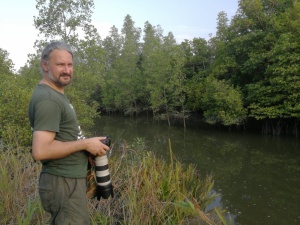Bridging biodiversity and gardening: unravelling the interplay of socio-demographic factors, garden practices, and garden characteristics
- Articles in non-SCI journals - international
- Jan, 2023
Varga-Szilay, Z., Fetyko, K. G., Szovenyi, G. & Pozsgai, G. (2023) Bridging biodiversity and gardening: unravelling the interplay of socio-demographic factors, garden practices, and garden characteristics. bioRxiv. DOI:10.1101/2023.12.03.569783.
Summary:
The expansion of urban areas threatens biodiversity, disrupts essential ecological relationships and jeopardises fragile ecological networks, thereby impedes key ecosystem services. To avert irreversible consequences, there is a focus on improving the biodiversity value of domestic gardens for both human well-being and conservation and a global imperative for well-planned and sustainable urban environments. Here, we employ machine learning and network analysis and examine gardening practices and garden owners’ environmental consciousness in Hungary through a questionnaire-based study to untangle the interplay among socio-demographic factors, garden management, and garden characteristics. We found that the activities determined as biodiversity-positive were widespread among respondents, but a lack of undisturbed areas (n = 624, 49.52%), mowing several times a month (n = 404, 32.06%) and ubiquitous pesticide use (n = 783, 62.14%) were also present. Middle-aged respondents demonstrated more biodiversity-supporting activities than those over 55, who had long-term gardening experience and were predominantly conventional gardeners. Residents of towns showed the least biodiversity-positive activities, whereas those living in cities and the countryside fared better. Additionally, multiple interconnected garden characteristics revealed various types of gardens distinguished by care practices and use, such as gardens for food self-provisioning, ornamental gardens, or those prioritizing biodiversity support. Our results show that garden owners use pesticides, and within them herbicides, independently of socio-demographic parameters, gardening practices, or garden characteristics, suggesting a widespread pesticide use in Hungary.
Our findings suggest that strategies, to promote biodiversity-friendly gardening practices may not be equally suitable for all European countries with different cultural backgrounds, environmental consciousness and pesticide use. In particular, factors like differences between societal groups underscore the preference for in-person programs over online information transfer in several cases, for instance, among the elderly and those living in the countryside. This study offers fresh perspectives on the intricate connections between garden diversity, characteristics, and practices, and it lays the groundwork for future research into the sociological drivers of gardening practices in Eastern Europe. Our work also emphasises that optimizing gardens for multiple ecosystem services, including biodiversity conservation and enhancing well-being across diverse societal groups, requires a nuanced understanding of both ecological and socio-demographic factors.
https://www.biorxiv.org/content/10.1101/2023.12.03.569783v2

